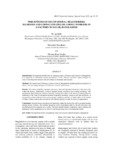| dc.contributor.author | Iacobelli, M. | |
| dc.contributor.author | Chowdhury, Morseda | |
| dc.contributor.author | Nagbe, Thomas Knue | |
| dc.date.accessioned | 2016-04-21T11:35:03Z | |
| dc.date.available | 2016-04-21T11:35:03Z | |
| dc.date.copyright | 2012 | |
| dc.date.issued | 2012-12 | |
| dc.identifier.citation | Iacobelli, M., Chowdhury, Morseda & Nagbe, Thomas Knue (2012). Perceptions of occupational health risks, illnesses and coping strategies among workers in a factory in Savar, Bangladesh. BRAC University Journal, Special Issue, 21-29. | en_US |
| dc.identifier.issn | 1811-3079 | |
| dc.identifier.uri | http://hdl.handle.net/10361/5179 | |
| dc.description | Includes bibliographical references (page 29). | en_US |
| dc.description.abstract | Introduction: Occupational health risks are emerging topics of interest and concern in Bangladesh. It is important to understand worker perceptions of risks, illnesses and their coping strategies in order to develop interventions relevant to their environment and concerns.
Methods: We interviewed 28 factory workers in Savar, Bangladesh identifying their perceptions of illness, risk and coping strategies for illnesses occurred in the factory.
Results: All workers identified repeated exposure to dust and industrial chemicals as the main risks within the factory. Additionally, workers reported unsafe conditions from cutting machinery with mechanical injury being the common outcome. Among all workers in the factory, common illnesses attributed to the work environment included respiratory disorders, anorexia and skin infections. It emerged from data collection that socioeconomic conditions and lack of rights added to the burden of illness. Some workers also resorted to self-inflicted injuries in order to receive compensation.
Conclusion: Societal factors and perceived hierarchy within the factory has led to an added burden among factory workers. The already dangerous work environment adds to the job insecurity and psychological stress imposed on a worker. Factories should include compulsory safety training and mandatory safety equipment use in order to curb the growing risks of occupational health. | en_US |
| dc.description.statementofresponsibility | M. Iacobelli | |
| dc.description.statementofresponsibility | Morseda Chowdhury | |
| dc.description.statementofresponsibility | Thomas Knue Nagbe | |
| dc.format.extent | 9 pages | |
| dc.language.iso | en | en_US |
| dc.publisher | BRAC University | en_US |
| dc.rights | BRAC University Journals are protected by copyright. They may be viewed from this source for any purpose, but reproduction or distribution in any format is prohibited without written permission. | |
| dc.subject | Occupational health | en_US |
| dc.subject | Occupational risk | en_US |
| dc.subject | Job security | en_US |
| dc.subject | Industrialization | en_US |
| dc.subject | Bangladesh | en_US |
| dc.title | Perceptions of occupational health risks, illnesses and coping strategies among workers in a factory in Savar, Bangladesh | en_US |
| dc.title.alternative | | en_US |
| dc.type | Article | en_US |
| dc.contributor.department | James P Grant School of Public Health, BRAC University | |

